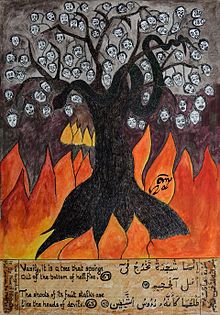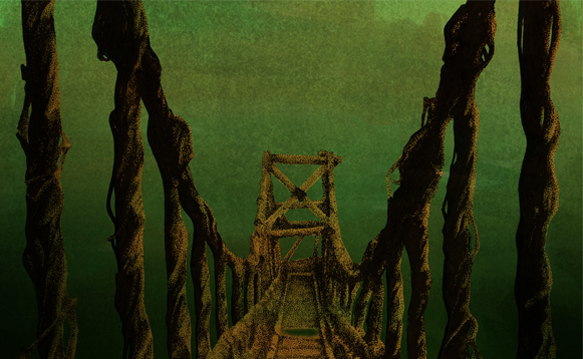Your translation of Merdan Ehet’éli’s poem “Common Night” is Asymptote‘s first piece from the Uyghur. I want to point out two words from the poem: “pig iron” and “hellfruit.” Can you tell us about these words and how you translated them?
The Uyghur word choyun (also chöyün) refers to pig iron or cast iron, and for me it calls to mind something hard and rough. The connotations are much less positive than the words tömür (iron) and polat (steel), both of which are used in Uyghur personal names. In speaking of “a night poured into our spines like pig iron,” Merdan Ehet’éli may be alluding to Tahir Hamut’s well-known poem “Summer Is a Conspiracy,” in which Tahir refers to fear’s “pig iron voice”, which “seeps into the marrow / and hardens.”
“Hellfruit” is my own coinage (as far as I know). It’s my way of avoiding the necessity of a footnote explaining the Zaqqum tree—but I’m glad you’ve given me the opportunity to explain it here, since it’s pretty cool. In the Islamic tradition, the Zaqqum is a tree growing in the depths of Hell, with fruit resembling the heads of devils. In Merdan’s poem, the night causes our noses to spew out Zaqqum leaves.

The association with the Zaqqum tree adds to the religious themes in the poem— God, Satan, Noah, and the Antichrist are also mentioned. Do “Satan” and “God” have direct translations from Uyghur into English?
This poem uses the most straightforward Uyghur words for Satan and God: sheytan (cognate to the Hebrew, Arabic, and English words for Satan) and xuda, from Persian khudā.
Have you translated other poems by Merdan? And have you been able to work with him on translation issues?
I’ve translated one other poem by Merdan, as yet unpublished. We’ve never met in person, but we’ve chatted a bit online. After translating “Common Night”, I asked Merdan for his thoughts on the interpretation of a few lines, which I found quite helpful as I tinkered with the translation. I love talking to poets about their work, and poetry translation is a great excuse to do so. I also got really useful comments on my English translation of this poem from my friend Sarah Vitali, a talented translator of Russian poetry.
You wrote in your translator’s note about the influence of Nothingism on Merdan’s poetry, a provocative movement that only presumably began in 2009. How is Merdan’s poetry received in his native language?
The Uyghur literary world has been changing rapidly as Internet usage has increased in China. While only a few of Merdan’s works have appeared in print journals, a fair amount of his poetry has been circulated online, which is where I first encountered it. A lot of what’s really vibrant and interesting in Uyghur poetry right now is happening primarily on the web, and even on phone messaging apps.
Merdan’s work is well regarded in modernist poetry circles. He’s part of an impressive cohort of young Uyghur poets who’ve emerged over the last few years, many of whom combine deep knowledge of Uyghur literature with extensive reading in Western, and sometimes Chinese, literature.
When did you first begin studying Uyghur?
I took a couple summer courses in college, but I only really got going with Uyghur after I moved to Xinjiang in 2005 to work as an English teacher, with the intention of learning Uyghur in my free time. After a year I left the teaching job but kept up with the Uyghur. I started doing translation work, and ultimately did a master’s degree in Uyghur Literature at Xinjiang Normal University in Ürümchi.
Aside from Merdan’s poems, what else have you translated? Have you translated prose works, or do you focus on poetry? Do you have a preference?
Before graduate school, I took on all kinds of translation work (articles, abstracts, etc.), but I’ve long preferred translating poems. I first started translating poetry in 2007, soon after encountering Uyghur modernist poetry for the first time. Writers like Perhat Tursun, Tahir Hamut, and Ghojimuhemmed Muhemmed are tremendously exciting, and I love translating their work.
What are you working on for your thesis? What translations are you working on next?
My dissertation deals with canon formation in Uyghur poetry: why have some poets come to be considered classic poets, while others remain largely forgotten? There’s far more going on here than the quality of their work and the test of time. I’m particularly interested in the reputation of one poet, Lutpulla Mutellip, who has become something of a literary legend since his death in 1945.
I did a bunch of translations over the summer, which I’ve been touching up and submitting to journals when I have a free moment. My prime interest as a translator remains modernist poetry, and I’d love to do an anthology someday. There are still quite a few excellent modernist poets writing in Uyghur who have not yet appeared in English translation.
*****
Ryan Mihaly is a musician, writer and artist living in Western Massachusetts. He is the Interview Features Editor for Asymptote. Read more about his work here.
Artwork by Samuel Hickson for our October Issue.

